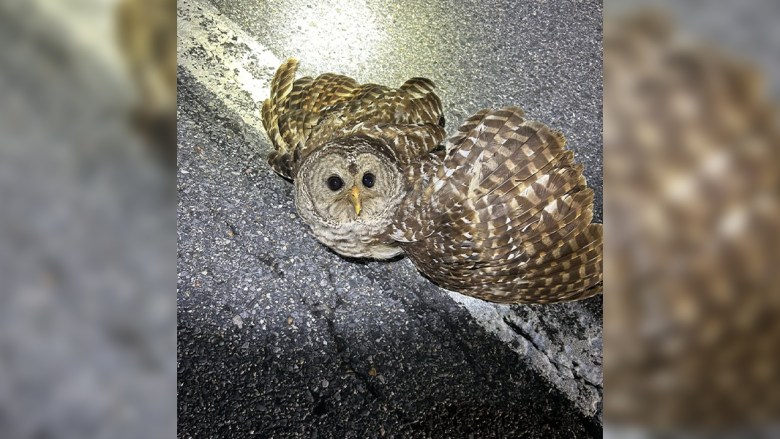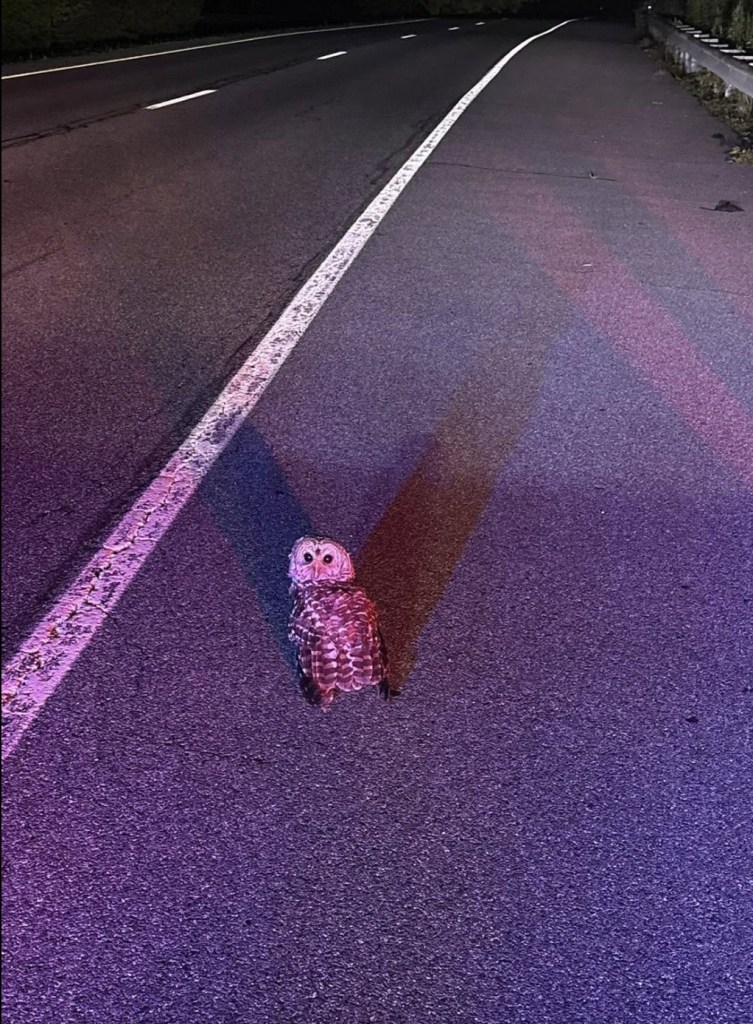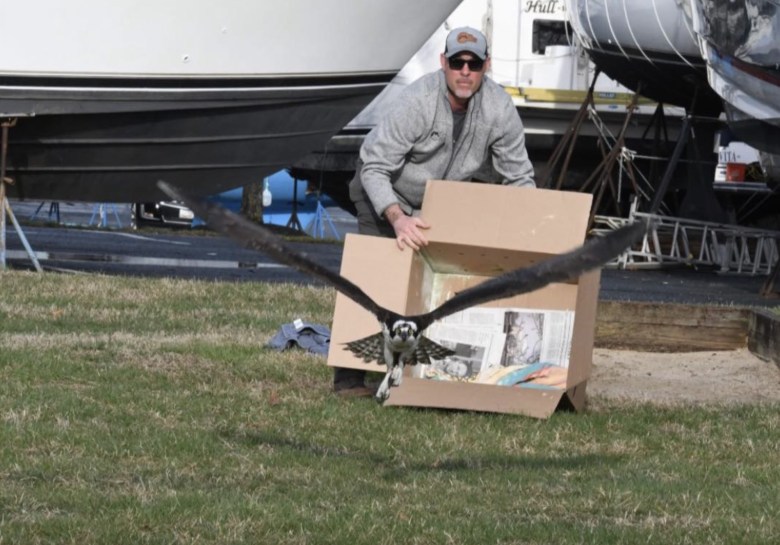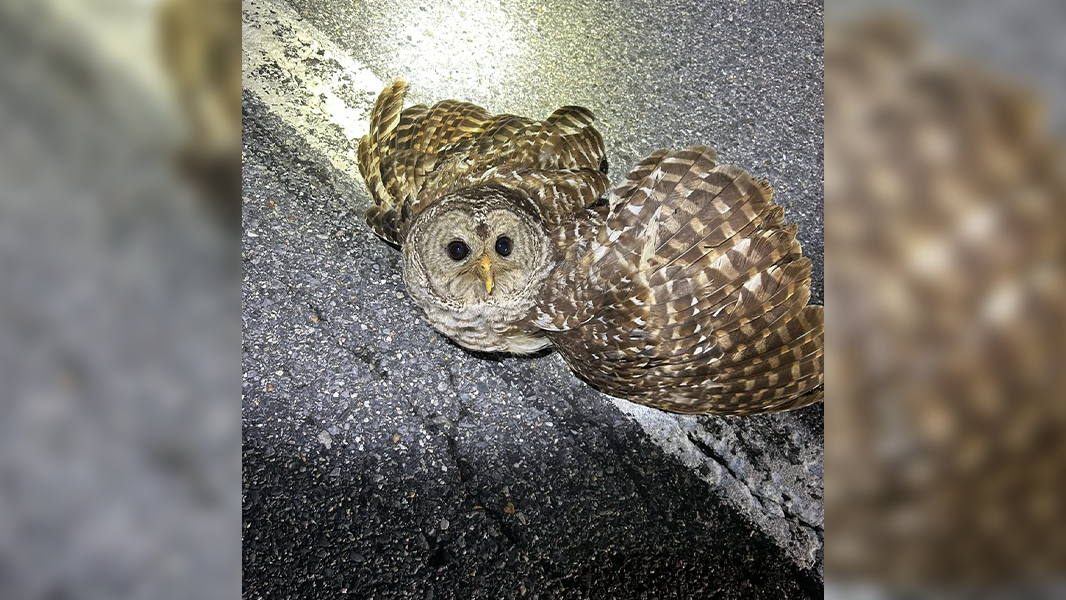 Source: Calvert County Sheriff’s Office Facebook
Source: Calvert County Sheriff’s Office Facebook
BOYDS, Md. — Earl, the barred owl found by Corporal Nikki Gilmore of the Calvert County Sheriff’s Office on June 29, has unfortunately passed away.
According to a volunteer at Owl Moon Raptor Center, Earl had “severe eye and head trauma, leaving him unable to see.” Owl Moon founder Suzanne Shoemaker confirmed and said that Earl had severe damage to both eyes and would have been permanently blind. Because he was in a lot of pain and would never return to the wild, the center chose to humanely euthanize Earl.
The volunteer said that in cases like Earl’s, there’s little they can do but relieve his suffering. She added that the organization is grateful for concerned and compassionate members of the public.
“In the case of this owl, without people caring he would have been left to suffer and eventually die a painful death,” she said. “With their help, he was in loving care the whole time.”
Owls rely on their powerful vision for everything from flying to finding prey, and unfortunately, car accidents like this one can cause severe injuries to their heads and vision where recovery isn’t possible.
Earl’s supporters can rest assured that Earl was in compassionate, loving hands at Owl Moon Raptor Center, an organization in Boyds, Maryland, dedicated exclusively to rescuing and rehabilitating birds of prey. Owl Moon is the only organization in the region that works exclusively with these birds and has already taken in about 400 individuals this year.
 Source: Calvert County Sheriff’s Office Facebook
Source: Calvert County Sheriff’s Office Facebook
“They’re all special,” Shoemaker said. “When a bird doesn’t make it, we take the time to grieve. Then there’s always another patient who needs us coming through the door.”
Shoemaker founded Owl Moon 15 years ago after working with Second Chance Wildlife Center in Gaithersburg. She decided to focus solely on birds of prey for a few reasons. One, she thought she could help more animals if they kept their focus narrow. Two, she saw that many members of the public were more afraid to handle birds of prey than they were songbirds or mammals. She wanted to make sure people in the area had someone to call, and the birds had somewhere to go.
Since then, Shoemaker and her team have gotten calls from all over Maryland, Virginia, West Virginia and Pennsylvania. They have staff at their center and a team of transport and rescue volunteers across the state — like volunteer Mary Hollinger, who transported Earl. Their team even includes “climbers” that help return baby birds to their nests.
And for anyone wondering, it’s a myth that birds will reject a baby if they’ve been handled by humans. Shoemaker says that birds are great parents and will never reject a baby — returning a baby to its nest is an example of a good time for human intervention. Her team frequently walks people through bird-baby return over the phone.
Birds of prey are vulnerable to human impact here in Southern Maryland. Barred owls and osprey are susceptible to fishing line entanglement because they fish in and around waterways — adult birds get entangled, but Shoemaker says she’s seen hatchlings entangled from birth by fishing debris in nests. Cooper’s hawks are prone to entanglement from netted koi pond covers. All birds of prey can become sick from eating rodents that have come into contact with rat poison — and all species, like Earl, can be seriously injured by the cars on our busy roads.
To help save more birds like Earl, people can take steps to minimize their impact on the environment in ways that could be harmful to birds. Shoemaker recommends being mindful of waste you leave behind when fishing and to put anything you’re discarding into the designated receptacles. Anyone can get involved in beach or spring cleanups and can choose not to use poison when managing rodents on their property.
 Source: Owl Moon Facebook | Osprey release in March 2025
Source: Owl Moon Facebook | Osprey release in March 2025
If you’re serious about getting involved with birds of prey, you can reach out to Owl Moon for volunteer opportunities. There’s plenty to choose from.
Shoemaker emphasized that anyone can help — simply looking around to reduce bird hazards makes a difference. Or if you see an injured bird of prey, you can make the right choice to find that bird care, like Corporal Gilmore did. Public knowledge and interest is vital to saving as many birds as possible.
You can follow the organization here.
“They are the real heroes,” Corporal Gilmore said of Owl Moon. “I was just crazy enough to pick Earl up and transport him to the right place.”
Got a tip or photo? Text us at 888-871-NEWS (6397) or email news@thebaynet.com.
Join The BayNet Membership for exclusive perks and zero ads.
Don’t miss a story—sign up for our newsletter!
Related
